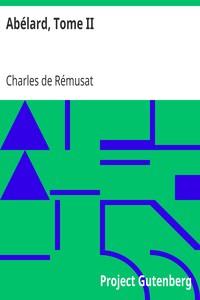Abélard, Tome II by Charles de Rémusat
"Abélard, Tome II" by Charles de Rémusat is a philosophical treatise written during the mid-19th century. This work delves deeply into the metaphysical inquiries of the medieval thinker Peter Abelard, particularly focusing on the extensive and contentious debates surrounding the nature of universals – concepts that are abstract and apply to multiple instances, like "humanity" for individual humans. The narrative primarily explores the intellectual environment of Abelard's time, addressing various schools of
thought regarding universals, including realism and nominalism. The opening of the treatise sets the stage for discussing the long-lasting controversy over the nature of genres and species, emphasizing its abstract nature and the fervent debates it sparked over the centuries. It begins by citing historical sentiments from figures like Jean de Salisbury regarding the intensity of intellectual disputes surrounding the nature of universals. The section outlines different philosophical positions, primarily contrasting realism—the belief in the existence of universals as entities in their own right—with nominalism, which considers universals as mere names or labels lacking independent existence. This introduction establishes both the historical context and the philosophical stakes of the discussions that will unfold in the book. (This is an automatically generated summary.)
Read or download for free
| How to read | Url | Size | |||
|---|---|---|---|---|---|
| Read now! | https://www.gutenberg.org/ebooks/13807.html.images | 1.1 MB | |||
| EPUB3 (E-readers incl. Send-to-Kindle) | https://www.gutenberg.org/ebooks/13807.epub3.images | 463 kB | |||
| EPUB (older E-readers) | https://www.gutenberg.org/ebooks/13807.epub.images | 482 kB | |||
| Kindle | https://www.gutenberg.org/ebooks/13807.kf8.images | 872 kB | |||
| older Kindles | https://www.gutenberg.org/ebooks/13807.kindle.images | 838 kB | |||
| Plain Text UTF-8 | https://www.gutenberg.org/ebooks/13807.txt.utf-8 | 1008 kB | |||
| Download HTML (zip) | https://www.gutenberg.org/cache/epub/13807/pg13807-h.zip | 451 kB | |||
| There may be more files related to this item. | |||||
Similar Books
About this eBook
| Author | Rémusat, Charles de, 1797-1875 |
|---|---|
| Title | Abélard, Tome II |
| Credits |
Produced by Robert Connal, Renald Levesque and the Online Distributed Proofreading Team, from images generously made available by gallica (Bibliotheque nationale de France). |
| Reading Level | Reading ease score: 64.4 (8th & 9th grade). Neither easy nor difficult to read. |
| Language | French |
| LoC Class | BX: Philosophy, Psychology, Religion: Christianity: Churches, Church movements |
| Subject | Abelard, Peter, 1079-1142 |
| Category | Text |
| EBook-No. | 13807 |
| Release Date | Oct 20, 2004 |
| Most Recently Updated | Dec 18, 2020 |
| Copyright Status | Public domain in the USA. |
| Downloads | 216 downloads in the last 30 days. |
| Project Gutenberg eBooks are always free! | |

